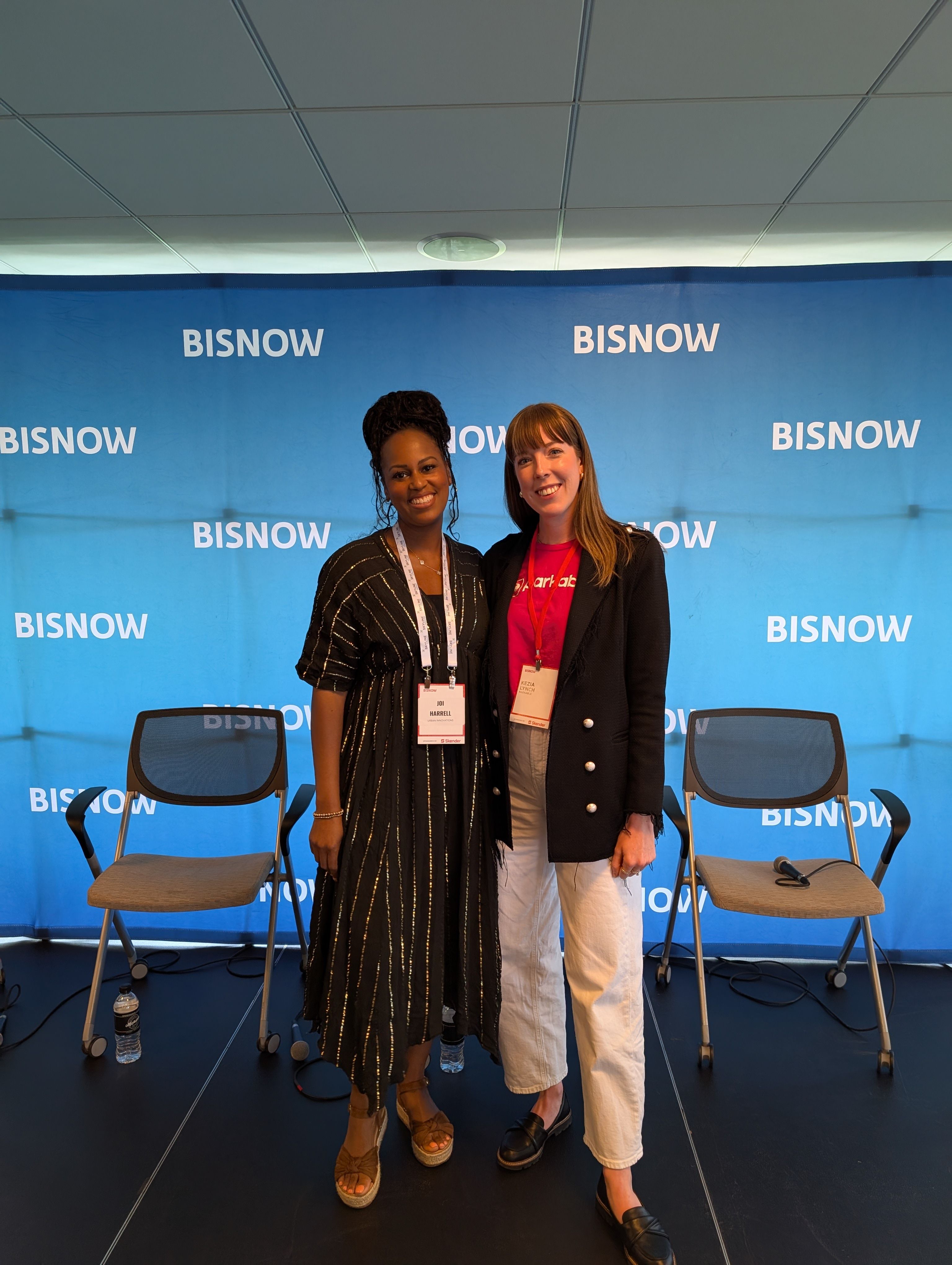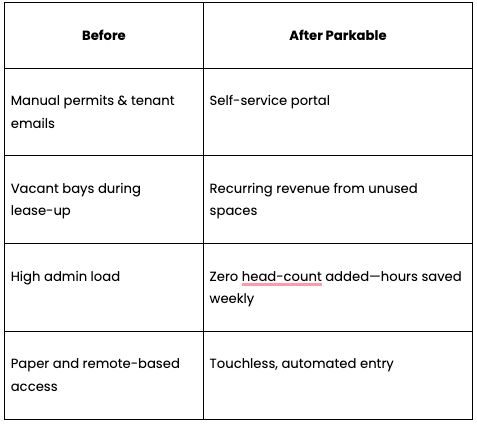The Parking Lever Boosting NOI for Smart Chicago Landlords
Just a few years ago, office parking quietly worked. Not perfectly—but predictably.
Tenants had monthly permits, the lot felt full enough to be efficient, and whether you managed it in-house or outsourced to an operator, it was “handled.”
Then hybrid work hit. And everything changed.
Suddenly, the system cracked:
- Reserved bays sat empty half the week
- On in-office days, it became chaos—tenants circling, tempers rising
- Frustration and revenue loss simmered below the surface, only to erupt at renewal time
“That old ‘set and forget’ mindset—whether self-managed or outsourced—no longer means ‘set it and forget the headaches,’” says Toby Littin, CEO of Parkable.
Parking payments still roll in, but NOI? Not so much. Operators come with high fixed costs. DIY means hours of admin and unhappy tenants.
So while the drive-in, drive-out model isn’t new, what is new is this: Smarter parking now offers a serious upgrade in tenant experience and a path to NOI growth—without the operational drag.
It’s no longer just a car park. It’s a leasing lever, a retention tool, and a hidden source of asset value.
The Hidden Cost of traditional Parking management
Hybrid schedules exposed the cracks. Manual spreadsheets, paper permits, and daily emails couldn’t keep up. Outsourced operators couldn’t adapt fast enough—or offer visibility.
“We saw tenant complaints spike,” Littin says. “It wasn’t a staffing problem—it was a visibility problem. Landlords didn’t need more operators. They needed modern tools.”
And the operational headaches came with a financial cost:
- Empty bays = tens of thousands in unrealized revenue
- Rigid systems = tenant frustration and leasing hesitation
- Admin overload = hours wasted weekly, or two FTEs just managing parking
“In some buildings, outdated processes were tying up the equivalent of two full-time staff. That’s time and money better spent on high-value activity.”
But for landlords willing to rethink parking, there’s a new path forward.
From Operational Headache to NOI Driver
Forward-thinking landlords across Chicago are shifting mindset. Parking isn’t just a utility. It’s a first impression, a retention engine, and a revenue lever.
With digital platforms like Parkable, the new playbook looks like this:
- Real-time dashboards give asset teams visibility across the portfolio
- Self-service portals put control in tenant hands
- Dynamic monetization turns underutilized bays into recurring income
- Touchless access removes admin-heavy systems
- Digitization removes the overhead—often enough to eliminate two operators

Case Study: Urban Innovations at 311 W Huron
Here’s how one progressive landlord transformed parking into a competitive advantage.
“Parking now delivers the same premium feel as our rooftop lounge or fitness center.” — Joi Harrell, Head of Property Management, Urban Innovations
Urban Innovations knew that premium tenants expect more than space—they expect every touchpoint to be seamless. That includes parking.
While preparing to lease 311 W Huron, the team rejected costly staffing and rigid third-party models in favor of Parkable’s flexible, digital solution.
With the Parkable platform:
- Tenants book, share, and reallocate spots directly
- License plate recognition enables instant, touchless access
- Bays were monetized before full occupancy
- The building avoided staffing costs or valet systems altogether
Before vs. After
“The experience was transformed from day one,” says Harrell. “It sets the tone for the entire building—just like the lobby does.”

The Bigger Shift: Parking as Amenity
According to CBRE’s 2024 U.S. Office Occupier Sentiment Survey, parking is now the #2 most desired office amenity. And 79% of Parkable clients say parking Impacts leasing decisions.
In a competitive market like Chicago, a seamless arrival experience is more than a nice-to-have. It's a strategic edge.
Landlords leading the way are making quiet fixes that echo across:
- Tenant satisfaction
- Retention and renewals
- Operational efficiency
- NOI performance
“We’re helping landlords turn underused basements into leasing advantages,” Littin says. “And we’re doing it without adding headcount or overhead.”
From Overhead to Asset: Rethinking Your Parking Strategy
If outdated systems are burning time and bleeding revenue, it’s time to join the great parking shift
Book your free parking audit – and discover how much NOI is hiding beneath your building.
Suggested articles
Lack of staff parking is a major bone of contention. Time wasted cruising for parking, and earlier starts by employees racing to win limited parking, take their toll on worker wellbeing. This is even more pressing with flexible working.
Seattle landlords are in a high-stakes battle for tenants and every advantage matters.
With downtown office vacancy topping 32%, owners are pouring millions into rooftop terraces and high-end lobbies. But many are missing one of the most powerful (and profitable) levers hiding in plain sight: the parking garage.
In a city shaped by hybrid work and long commutes, parking has become a top-two tenant priority and a quiet driver of NOI. This article breaks down how forward-thinking landlords are turning empty bays into booked spots, revenue, and tenant loyalty -without building a single new space.
As we dive right into 2023, uncertainty over the global economy continues to loom. From central banks continuing rate hikes to investors nervously wondering whether a soft-landing remains possible. With this, individuals are looking into cost-cutting measures – whether in their own lives as well as their businesses.
 Blog
Blog